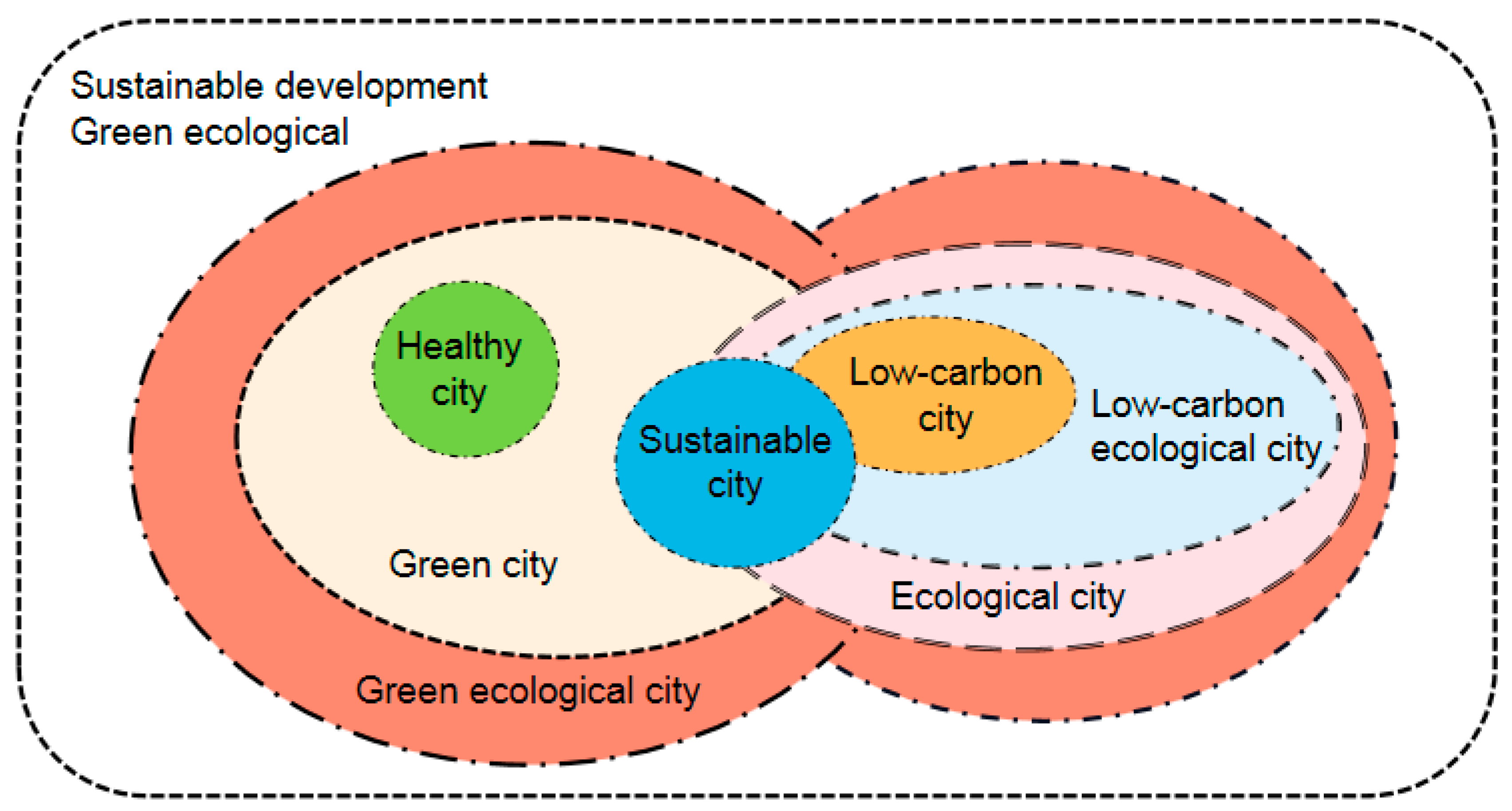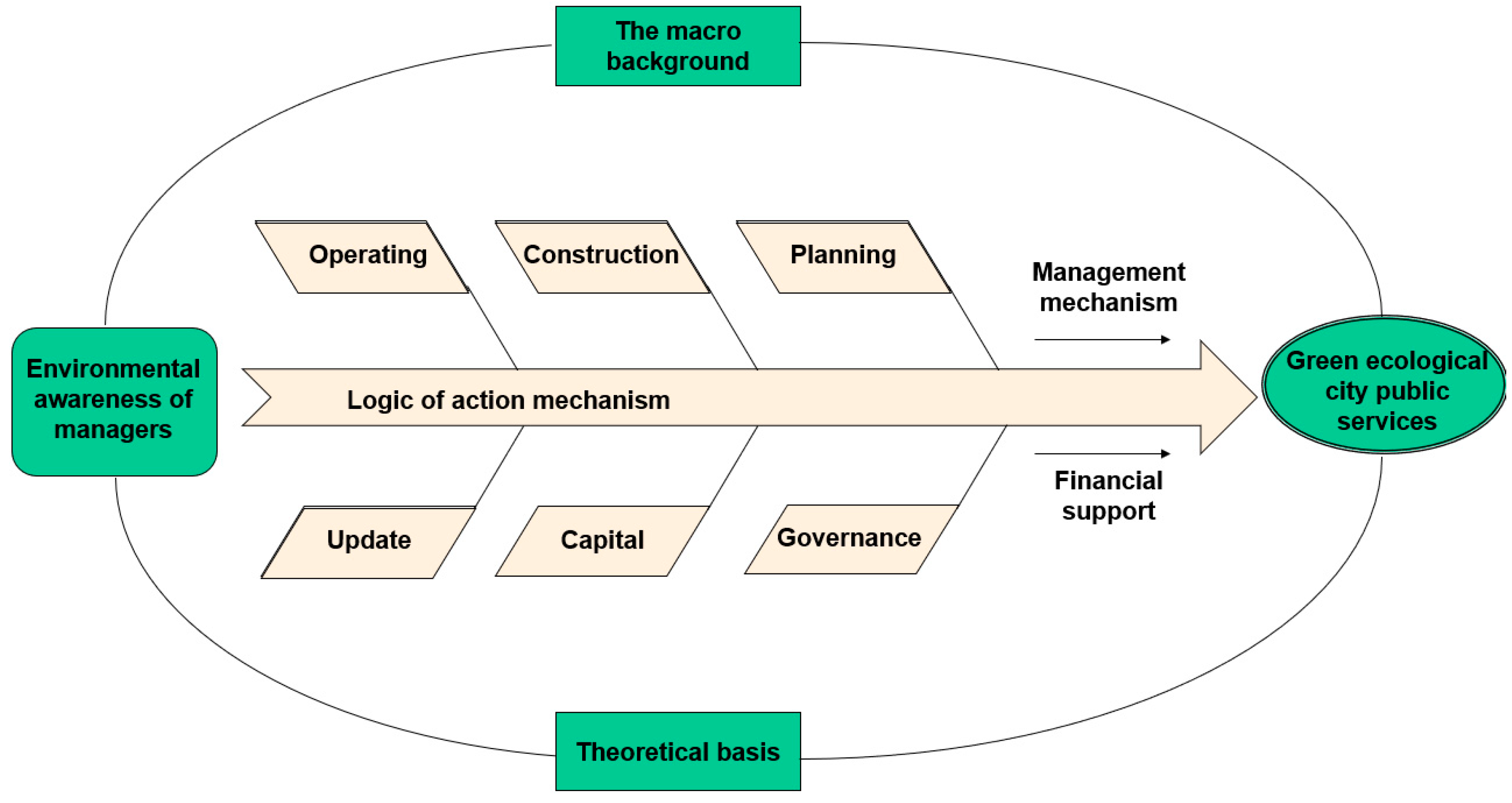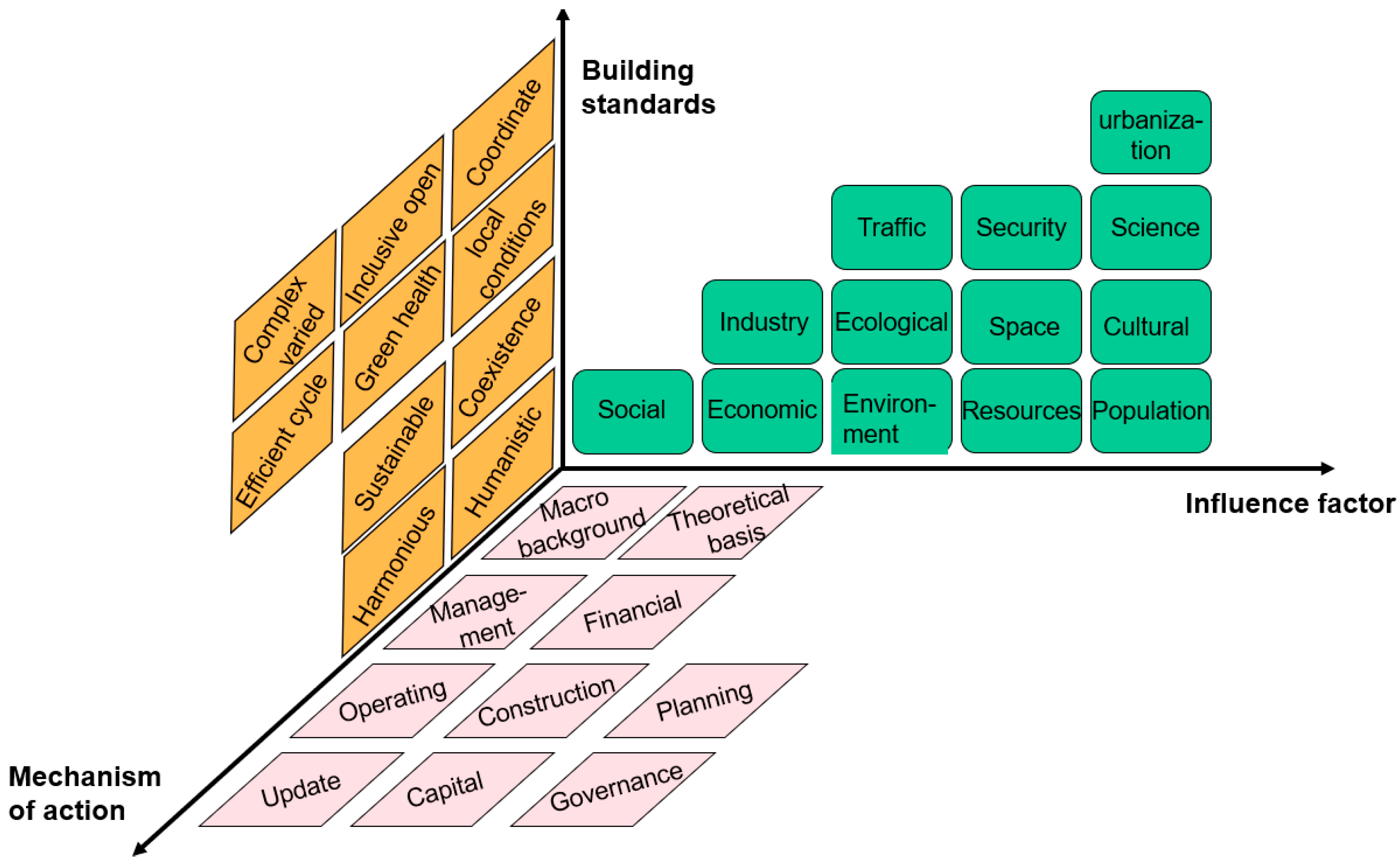The Impact of Managers’ Environmental Cognition on Urban Public Service Innovation from the Perspective of Green Ecology
Abstract
1. Introduction
2. Materials and Methods
2.1. Characteristics of Managers’ Environmental Cognition from the Perspective of Green Ecology
2.2. Connotations of Green Ecological City Public Services
2.3. The Theoretical Connection between Managers’ Environmental Cognition and Urban Public Services
3. Analysis of the Results and Discussion
3.1. Model Construction Criteria
3.2. Main Influencing Factors
3.3. Mechanism of the Model
3.4. Model
4. Conclusions
Author Contributions
Funding
Data Availability Statement
Conflicts of Interest
References
- Pan, H.; Tang, Z.; Han, J.; Sun, H. From Green to Healthy, Analysis of Humanistic Strategy under Ecological City Space. IOP Conf. Ser. Earth Environ. Sci. 2020, 615, 012025. [Google Scholar] [CrossRef]
- Yang, Q.; Gao, D.; Song, D.; Li, Y. Environmental regulation, pollution reduction and green innovation: The case of the Chinese Water Ecological Civilization City Pilot policy. Econ. Syst. 2021, 45, 100911. [Google Scholar] [CrossRef]
- Su, T. Research on the Allocation of Urban and Rural Public Service Facilities Based on Life Circle Theory—A Case Study of Honghu City, Hubei Province. Open Access Libr. J. 2021, 8, 7. [Google Scholar] [CrossRef]
- Jaung, W.; Carrasco, L.R.; Richards, D.R.; Shaikh, S.F.E.A.; Tan, P.Y. The role of urban nature experiences in sustainable consumption: A transboundary urban ecosystem service. Environ. Dev. Sustain. 2022, 1–21. [Google Scholar] [CrossRef]
- Vinci, S.; Egidi, G.; López Gay, A.; Salvati, L. Population Growth and Urban Management in Metropolitan Regions: The Contribution of Natural Balance and Migration to Polycentric Development in Barcelona. Appl. Spat. Anal. Policy 2021, 15, 71–94. [Google Scholar] [CrossRef]
- Simone, C.; Iandolo, F.; Fulco, I.; Loia, F. Rome was not built in a day. Resilience and the eternal city: Insights for urban management. Cities 2021, 110, 103070. [Google Scholar] [CrossRef]
- Suleimany, M. Smart Urban Management and IoT; Paradigm of E-Governance and Technologies in Developing Communities. In Proceedings of the 2021 5th International Conference on Internet of Things and Applications, Isfahan, Iran, 19–20 May 2021. [Google Scholar]
- Muafeq, H.; Ghalib, G.; Gaefer, A. Activating the ecological role of urban management tasks in the city environment. IOP Conf. Ser. Earth Environ. Sci. 2021, 790, 012050. [Google Scholar] [CrossRef]
- Xi, X.; Han, F.; Xie, Y.; Yang, L.; Yan, H.; Luo, C.; Sun, L. The Key Factors Influencing the Decline of Carbon Emission Intensity in Low-Carbon Cities and Countermeasure Research—A Case of Fuzhou, Jiangxi. IOP Conf. Ser. Earth Environ. Sci. 2021, 769, 022040. [Google Scholar] [CrossRef]
- Jin, Z. Green city economic efficiency based on cloud computing and machine learning. Arab. J. Geosci. 2021, 14, 2599. [Google Scholar] [CrossRef]
- Yan, J.; Yang, J.; Zhu, F.; Teng, Z. Green city and government ecological environment management based on ZigBee technology. Environ. Technol. Innov. 2021, 23, 101711. [Google Scholar] [CrossRef]
- Kimpouni, V.; Nzila, J.D.D.; Watha-Ndoudy, N.; Bilongo, E.C.K.; Mouhamed, S.Y.; Kampe, J.-P.; Louembe, D. Sociocultural and Ecological Dynamics of Green Spaces in Brazzaville (Congo). Int. J. Ecol. 2020, 2020, 3719267. [Google Scholar] [CrossRef]
- Haider, S.; Hafeez, I. A step toward smart city and green transportation: Eco-friendly waste PET management to enhance adhesion properties of asphalt mixture. Constr. Build. Mater. 2021, 304, 124702. [Google Scholar] [CrossRef]
- Wang, R.; Wu, H.; Chiles, R. Ecosystem Benefits Provision of Green Stormwater Infrastructure in Chinese Sponge Cities. Environ. Manag. 2022, 69, 558–575. [Google Scholar] [CrossRef]
- Shen, F.; Liu, B.; Luo, F.; Wu, C.; Chen, H.; Wei, W. The effect of economic growth target constraints on green technology innovation. J. Environ. Manag. 2021, 292, 112765. [Google Scholar] [CrossRef] [PubMed]
- Babar, M.; Khattak, A.S.; Jan, M.A.; Tariq, M.U. Energy Aware Smart City Management System using Data Analytics and Internet of Things. Sustain. Energy Technol. Assess. 2021, 44, 100992. [Google Scholar] [CrossRef]
- Cai, M.; Shi, Y.; Ren, C. Developing a High-resolution Emission Inventory Tool for Low-Carbon City Management Using Hybrid Method—A Pilot Test in High-density Hong Kong. Energy Build. 2020, 226, 110376. [Google Scholar] [CrossRef]
- Sun, X. Green city and regional environmental economic evaluation based on entropy method and GIS. Environ. Technol. Innov. 2021, 44, 101667. [Google Scholar] [CrossRef]
- Laurini, R. A primer of knowledge management for smart city governance. Land Use Policy 2021, 111, 104832. [Google Scholar] [CrossRef]
- Abhirami, K.S.; Kunnel, A.P.; Archa, R.; Latheef, A.; Bindiya Hari, P. Assessment of Municipal Solid Waste Management in Kochi City. IJERT—Int. J. Eng. Res. Technol. 2021, 9, 64–68. [Google Scholar]
- Huiyi, Z.; Vignesh, C.C.; Daniel, J.A. Influence of Social and Environmental Responsibility in Energy Efficiency Management for Smart City. J. Interconnect. Netw. 2021, 22, 2141002. [Google Scholar]
- Wu, Y. Ecological Smart City Construction Based on Ecological Economy and Network Governance. Comput. Intell. Neurosci. 2022, 2022, 5682965. [Google Scholar] [CrossRef] [PubMed]







| Characteristics of Categories | Specific Characteristics | Explanation |
|---|---|---|
| Constituent Characteristics | System | The composition of managers’ environmental cognition is systematic. As city management involves many elements, their environmental cognition must seek the balance of the whole system in multi-dimensions. |
| Open | The process of urban management is a process of exchange and replacement with the outside world, so its environmental cognition must ensure that the city always maintains an open circulation and circulation with the outside world. | |
| Complexity | Environmental cognition is complicated because the core purpose of both urban management and public services is to serve urban residents. The complexity of human beings results in the complexity of environmental cognition. | |
| Target Characteristics | Diversity | The management of a green ecological city should show diversity in levels, elements, and associations to better guarantee the diversity and vitality of the city. |
| High Efficiency | From the perspective of green ecology, urban management should be efficient to achieve sustainable urban development. | |
| Compound | In urban management, the green concept and ecological concept are fully combined to realize the coordination and unity of ecological, social, production, cultural, and other urban functions. | |
| Security | Safety is an important prerequisite for management. From the perspective of green ecology, managers’ environmental cognition goals should also pay attention to the security guarantee of urban social stability, economic development, natural resources, the environment, public safety, and health. | |
| Health | Urban management should contribute to the health of urban residents, their living environment, and their future development. | |
| Evolution Characteristics | Dynamic | As things develop, the environmental cognition formed by managers should also have a certain dynamic and it should dynamically adjust with the process of urban development. |
| Adaptive | The urban system responds to the external environment and eventually feeds back into the human and social systems. Therefore, managers’ environmental cognition also needs to adapt to this feedback and achieve the dynamic adaptation of the internal and external circulation of management through continuous adjustment, feedback, re-adjustment, and re-feedback. | |
| Features of the Measures | Cyclical | From the perspective of green ecology, the measures taken by managers based on environmental cognition should reflect the concept of circular development, which is a virtuous cycle of all systems and levels of the city, to improve the overall urban public service efficiency and resource utilization rate. |
| Compactness | Compactness refers to the specific measures formulated by managers to pay attention to the appropriate and compact use of injected land, public infrastructure, and public services rather than ignoring costs in order to achieve green ecological goals. | |
| Value Characteristics | Human Nature | The value of urban managers’ environmental cognition is primarily people-oriented. Whether it is the construction of green ecological cities or the provision and innovation of public services, the fundamental goal and the method of value realization are to realize the comprehensive and free development of human beings on the basis of a harmonious coexistence between man and nature. |
| Symbiotic | Symbiosis emphasizes that managers should pay attention to the city rather than a single individual in their environmental cognition. In the process of providing green and ecological public services, they should pay attention to mutual assistance and mutualism outside the city, between cities and regions, and between cities. | |
| Harmony | It is emphasized that managers’ environmental cognition should be based on harmony. It is not necessary to sacrifice the interests of a small number of groups to achieve a certain goal, but all urban residents should do their best and give full play to their strengths whilst enjoying the wellbeing brought about by green ecological cities so that harmony and consistency can help urban development. |
Publisher’s Note: MDPI stays neutral with regard to jurisdictional claims in published maps and institutional affiliations. |
© 2022 by the authors. Licensee MDPI, Basel, Switzerland. This article is an open access article distributed under the terms and conditions of the Creative Commons Attribution (CC BY) license (https://creativecommons.org/licenses/by/4.0/).
Share and Cite
Liu, L.; Zhou, Y. The Impact of Managers’ Environmental Cognition on Urban Public Service Innovation from the Perspective of Green Ecology. Int. J. Environ. Res. Public Health 2022, 19, 15945. https://doi.org/10.3390/ijerph192315945
Liu L, Zhou Y. The Impact of Managers’ Environmental Cognition on Urban Public Service Innovation from the Perspective of Green Ecology. International Journal of Environmental Research and Public Health. 2022; 19(23):15945. https://doi.org/10.3390/ijerph192315945
Chicago/Turabian StyleLiu, Ling, and Yuanyuan Zhou. 2022. "The Impact of Managers’ Environmental Cognition on Urban Public Service Innovation from the Perspective of Green Ecology" International Journal of Environmental Research and Public Health 19, no. 23: 15945. https://doi.org/10.3390/ijerph192315945
APA StyleLiu, L., & Zhou, Y. (2022). The Impact of Managers’ Environmental Cognition on Urban Public Service Innovation from the Perspective of Green Ecology. International Journal of Environmental Research and Public Health, 19(23), 15945. https://doi.org/10.3390/ijerph192315945







